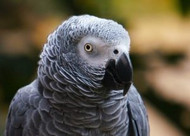Normal Vocalisations For Parrots
Posted by Normal Vocalisations, Parrots talking, talking Parrots, Do Parrots imitate humans, do Parrots know what they say, why can Parrots talk, why Parrots can talk on 3/4/2025
Lafeber tells us about normal vocalisations for Parrots.
There?s no such thing as a quiet bird. Some are quieter than others, usually because of size ? the bigger the bird, the louder the volume. However, what small birds lack in volume, many make up for in persistence.
For some people, the intermittent squawking of a Macaw is more acceptable than the persistent low cooing of doves. In any case, there?s no way to get a bird to be completely quiet, or to be quiet when you desire. Making noise is instinctual for birds, it is how they communicate, form bonds and defend themselves.
Here are some forms of normal birdie communication:
Chattering
Small birds chatter throughout the day for various reasons. Most birds are the most vocal at dawn and dusk, when they?re getting ready to feed. Some small birds will even chatter in their sleep during the day, a protective adaptation to show predators that they are awake and alert, not catnapping and vulnerable.

Screaming
Some Parrots scream and screech, which is normal to a degree. Parrots that scream the loudest are those that tend to mingle in mixed groups, like many of the South American species. They have to be loud to be heard over the din of so many voices.
Species that tend to stick together in a single-species flock are often quieter ? not necessarily less persistent, but slightly lower in volume. These include many of the African species.
Contact Calling
You may notice that your bird seems to ?call? you persistently and won?t quiet down until you enter the room. In the wild, this is called ?contact calling.? Birds like to know where their partners are, so they call loudly expecting that the other will call back.
This helps partners locate each other and affirms that both are safe. Your bird may want to participate in ?contact calling? with you. It?s really easy ? if you sense that your bird is calling you, either by screaming or whistling, simply call back that you?re okay.
You can make a game of it. This helps the bird feel secure and will usually quiet him down after a few calls ? well, depending on the bird!
Talking & Whistling
Many Parrots can learn to mimic human speech, and some can even learn to understand what they are saying and use words in context. You can?t really ?teach? your bird to talk; either it will or it won?t.
The best you can do is talk to the bird a lot and repeat specific words and phrases that you?d like him to learn as part of normal vocalisations. Birds are confounding sometimes; it?s likely your bird will learn something you didn?t want him to! If your bird
doesn?t learn to talk, it doesn?t mean that he isn?t smart; perhaps he is not of a species that can learn to talk. Also, the females of some species are less likely to speak than males.
Hissing & Growling
Cockatiels and African Greys are known for hissing and growling when they feel threatened. If a bird hisses and growls at you, back off. This means that the bird feels cornered and may lash out to protect himself.
What are your Parrot's normal vocalisations?

